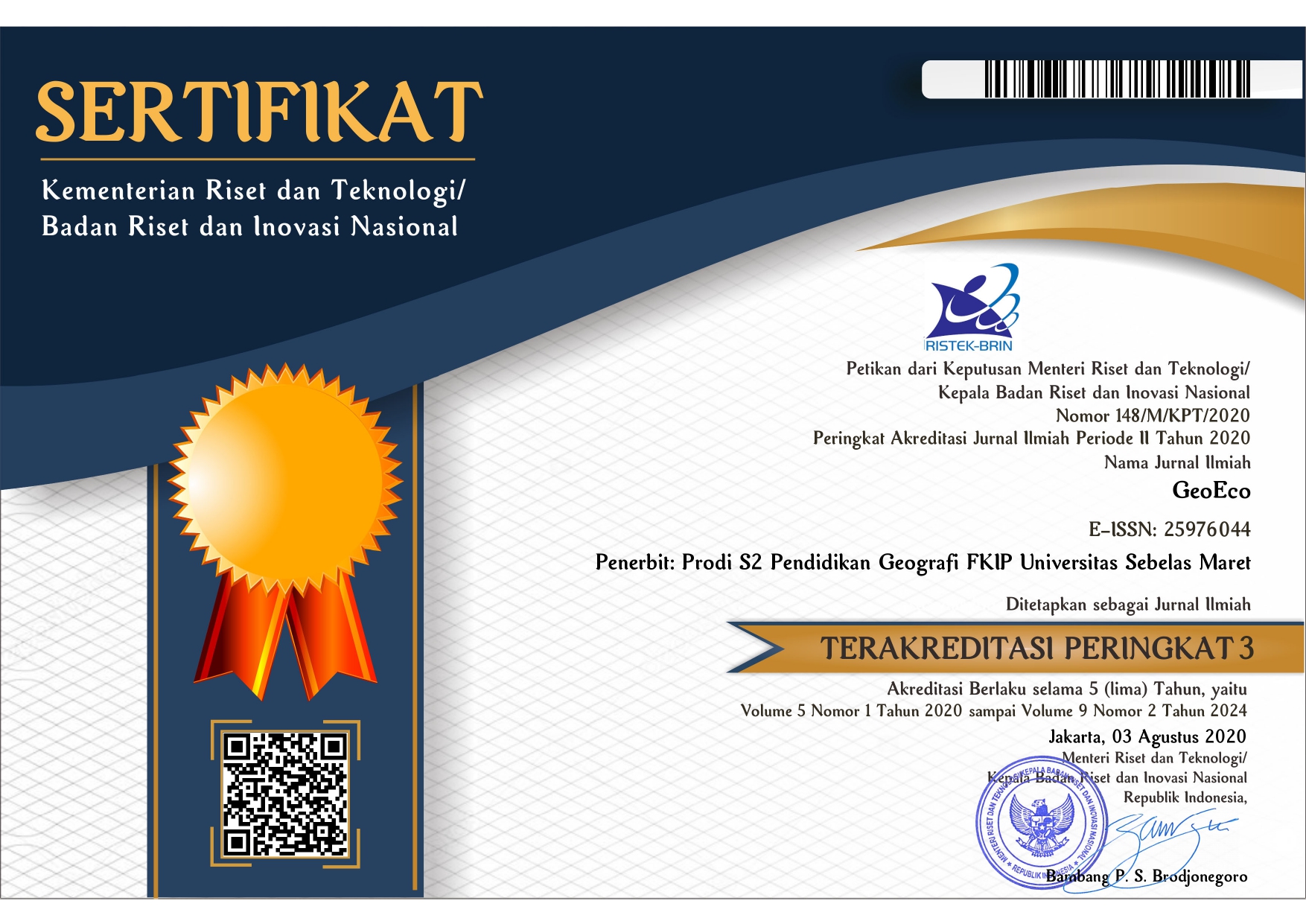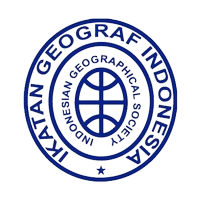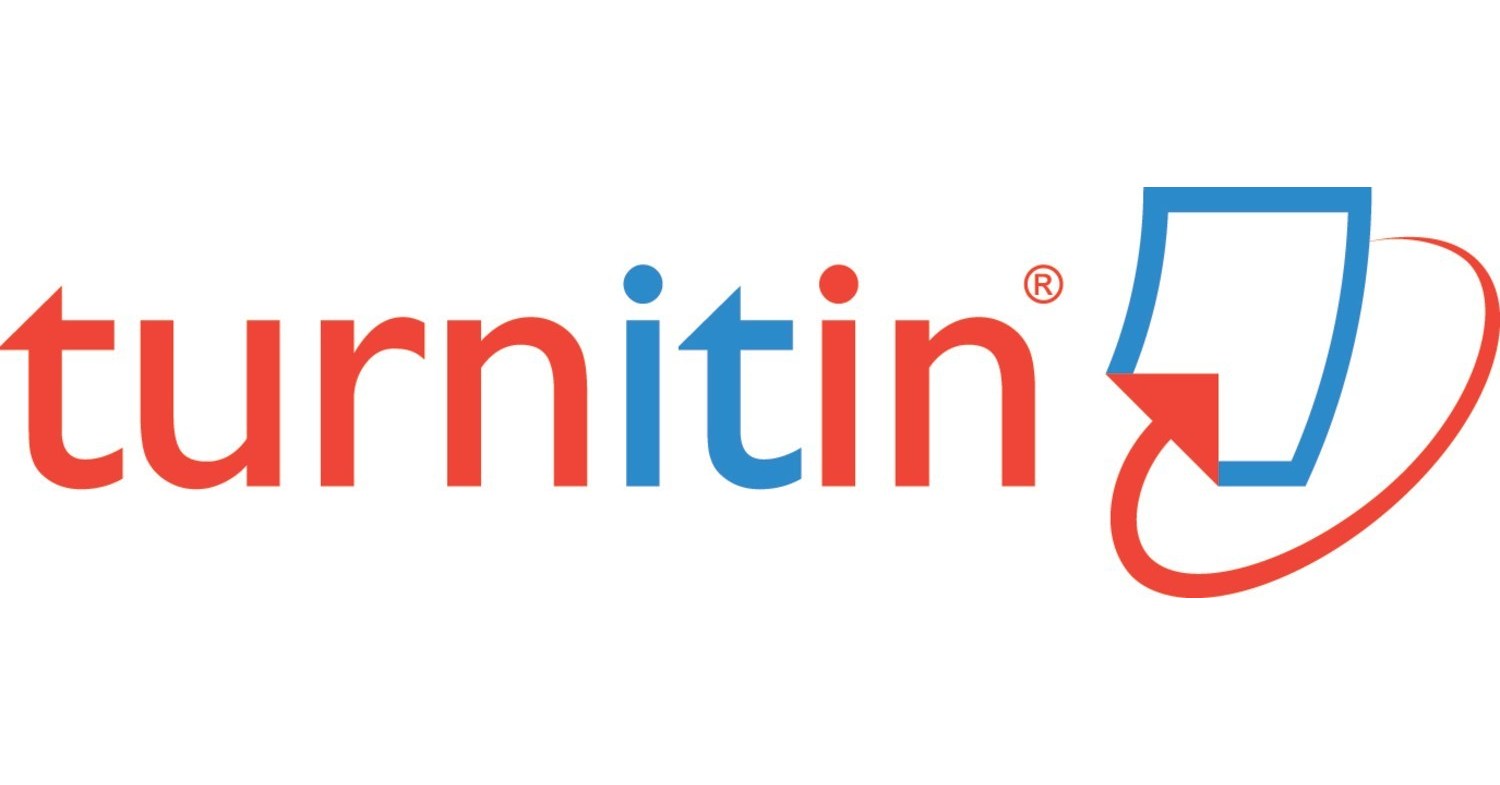TRANSFORMATION OF GEOGRAPHY EDUCATION IN THE DIGITAL ERA: EVALUATION OF GEOGRAPHY TEACHER READINESS THROUGH OUTCOME-BASED EDUCATION (OBE) APPROACH
Abstract
Keywords
Full Text:
PDFReferences
Akramy, S. A. (2021). Implementation of outcome-based education (obe) in Afghan universities: lecturers’ voices. International Journal of Quality in Education, 5(2), 27–47. https://orcid.org/0000-0002-7770-4474
Anunti, H., Vuopala, E., & Rusanen, J. (2020). A Portfolio Model for the Teaching and Learning of GIS Competencies in An Upper Secondary School: A Case Study from A Finnish Geomedia Course REVIEW OF INTERNATIONAL GEOGRAPHICAL EDUCATION. Review Of International Geographical Education, 10(3). https://doi.org/10.33403rigeo.741299
Artacho, E. G., Martínez, T. S., Ortega Martín, J. L., Marín Marín, J. A., & García, G. G. (2020). Teacher training in lifelong learning-the importance of digital competence in the encouragement of teaching innovation. Sustainability (Switzerland), 12(7). https://doi.org/10.3390/su12072852
Baroud, J., & Dharamshi, P. (2020). A Collaborative Self Study of Critical Digital Pedagogies in Teacher Education. Studying Teacher Education, 16(2), 164–182. https://doi.org/10.1080/17425964.2020.1739639
Berutu, N., Damanik, M. R. S., & Kabatiah, M. (2024, February 9). Evaluation and Development of Outcome-Based Education (OBE) Curriculum: An Analysis of Stakeholder Responses. https://doi.org/10.4108/eai.24-10-2023.2342189
Cladis, A. E. (2020). A shifting paradigm: An evaluation of the pervasive effects of digital technologies on language expression, creativity, critical thinking, political discourse, and interactive processes of human communications. E-Learning and Digital Media, 17(5), 341–364. https://doi.org/10.1177/2042753017752583
Creswell, J. W. (2023). Research Design Pendekatan Kualitatif, Kuantitatif, dan Mixed (A. Fawaid, Trans.; Edisi ketiga). Pustaka Pelajar.
Dias-Trindade, S., & Moreira, J. A. (2020). Assessment of high school teachers on their digital competences. Magis, 13, 01–21. https://doi.org/10.11144/Javeriana.m13.ahst
Ertmer, P. A., & Ottenbreit-Leftwich, A. T. (2010). Teacher Technology Change: How Knowledge, Confidence, Beliefs, and Culture Intersect. Journal of Research on Technology in Education, 42(3), 255–284. https://doi.org/https://doi.org/10.1080/15391523.2010.10782551
Falloon, G. (2020). From digital literacy to digital competence: the teacher digital competency (TDC) framework. Educational Technology Research and Development, 68(5), 2449–2472. https://doi.org/10.1007/s11423-020-09767-4
Ismail, M. I., & Ilyas, N. I. (2023). Metodologi Penelitian Kualitatif dan Kuantitatif (Monalisa, Ed.; Pertama). Rajagrafindo Persada.
Katawazai, R. (2021). Implementing outcome-based education and student-centered learning in Afghan public universities: the current practices and challenges. Heliyon, 7(5). https://doi.org/10.1016/j.heliyon.2021.e07076
Khan, Z. H., & Abid, M. I. (2021). Distance learning in engineering education: Challenges and opportunities during COVID-19 pandemic crisis in Pakistan. International Journal of Electrical Engineering Education. https://doi.org/10.1177/0020720920988493
Korkmaz, G., & Toraman, Ç. (2020). Are We Ready for the Post-COVID-19 Educational Practice? An Investigation into What Educators Think as to Online Learning. International Journal of Technology in Education and Science (IJTES), 4(4), 293–309. https://doi.org/https://doi.org/10.46328/ijtes.v4i4.110
Kurniawan, E., & Eva, B. (2020). A Teaching Based Technology in Geography Learning. Cypriot Journal of Educational Sciences, 15(4), 766–776. https://doi.org/10.18844/cjes.v%vi%i.5058
Liang, L., Huang, X., Huang, F., Yuan, M. Y. X., & Liu, X. (2022). The Reform of GIS Practice Curriculum for Geography Science (Normal) Major Integrating Geographic Big Data and Multi-track Teaching Mode. The Educational Review, USA, 6(9), 473–481. https://doi.org/10.26855/er.2022.09.004
Lubis, M. S. A., Fatmawati, E., Pratiwi, E. Y. R., Sabtohadi, J., & Damayanto, A. (2022). Understanding Curriculum Transformation Towards Educational Innovation In The Era Of All-Digital Technology. Nazhruna: Jurnal Pendidikan Islam, 5(2), 526–542. https://doi.org/https://doi.org/10.31538/nzh.v5i2.2110
Lukman, A. K. (2021). Best Practices and Challenges of Outcomes Based Education (OBE) in Social Sciences Instruction of Junior High School Students in Jolo, Sulu. Open Access Indonesia Journal of Social Sciences, 4(2), 209–218. https://doi.org/10.37275/oaijss.v4i2.49
Morote, Á. F., Hernández, M., & Olcina, J. (2021). Are future school teachers qualified to teach flood risk? An approach from the geography discipline in the context of climate change. Sustainability (Switzerland), 13(15). https://doi.org/10.3390/su13158560
Puertas Aguilar, M. Á., Conway, B., De Lázaro Torres, M. L., De Miguel González, R., Donert, K., Linder-Fally, M., Parkinson, A., Prodan, D., Wilson, S., & Zwartjes, L. (2022). A Teaching Model to Raise Awareness of Sustainability Using Geoinformation. Espacio Tiempo y Forma. Serie VI, Geografía, 15, 23–42. https://doi.org/10.5944/etfvi.15.2022.33687
Puertas-Aguilar, M. Á., Sipols, A. E. G., & de Lázaro-Torres, M. L. (2023). Web GIS to Learn Geopolitics in Secondary Education: A case study from Spain. European Journal of Geography, 14(2), 15–31. https://doi.org/10.48088/ejg.m.pue.14.2.015.031
Purwanto, Hidayah, N., & Wagistina, S. (2023). The Effect of Gersmehl’s Spatial Learning on Students’ Disaster Spatial Literacy. International Journal of Educational Methodology, 9(2), 345–354. https://doi.org/10.12973/ijem.9.2.345
Puspitasari, P. E., & Utami, R. D. (2023). Analysis Of Teachers Readiness In Implementing The Independent Curriculum In Elementary Schools. Didaktika Tauhidi: Jurnal Pendidikan Guru Sekolah Dasar, 10(2), 145–156. https://doi.org/10.30997/dt.v10i2.9761
Revilla, D. M., María Martínez-Ferreira, J., & Sánchez-Agustí, M. (2020). Assessing the digital competence of educators in social studies: An analysis in initial teacher training using the TPACK-21 model. In Australasian Journal of Educational Technology (Vol. 2020, Issue 2).
Rombe, S. (2024). Tinjauan Literatur Sistematis: Desain Pembelajaran Geografi di Era digital. El-Jughrafiyah, 4(2). https://ejournal.uin-suska.ac.id/index.php/jughrafia/article/view/31434
Ryan, A. W., & Aasetre, J. (2021). Digital storytelling, student engagement and deep learning in Geography. Journal of Geography in Higher Education, 45(3), 380–396. https://doi.org/10.1080/03098265.2020.1833319
Safitri, M., & Ridwan Aziz, M. (2024). Outcome Based Education (OBE) Design for Prospective Mathematics Teachers. 3rd International Conference on Education, 3, 9–13.
Sánchez-Cruzado, C., Santiago Campión, R., & Sánchez-Compaña, M. T. (2021). Teacher digital literacy: The indisputable challenge after covid-19. Sustainability (Switzerland), 13(4), 1–29. https://doi.org/10.3390/su13041858
Sarfraz, S., Mansoor, Z., & Tariq, U. (2023a). Multicultural Education Analysis of the English Language Teachers’ Constraints in Implementing Outcome-Based Educational Approach for Engineering Students. Multicultural Education, 9(3). https://doi.org/10.5281/zenodo.7783402
Sarfraz, S., Mansoor, Z., & Tariq, U. (2023b). Multicultural Education Analysis of the English Language Teachers’ Constraints in Implementing Outcome-Based Educational Approach for Engineering Students. Multicultural Education, 9(3). https://doi.org/10.5281/zenodo.7783402
Scherer, R., & Teo, T. (2019). Unpacking teachers’ intentions to integrate technology: A meta-analysis. In Educational Research Review (Vol. 27, pp. 90–109). Elsevier Ltd. https://doi.org/10.1016/j.edurev.2019.03.001
Sindhu, S., Khan, R. M. A., & Hussain, S. (2023). Enhancing English Learning through Technology: Assessing the Role of Technological Tools in Advancing Outcomes-Based Education within the English Access Micro Scholarship Program. International Research Journal of Education and Innovation, 4(4), 29–44. https://irjei.com/index.php/irjei/article/view/202
Suharsono, S., Simanjuntak, O. S., Perwira, R. I., Pambudi, S., Fachrurradjie, M., & Aqillasari, Y. P. (2024). Development of a Semester Learning Plans System based on OBE (Outcome-Based Education). Proceedings of the 2nd International Conference on Advanced Research in Social and Economic Science, 485–501. https://doi.org/10.2991/978-2-38476-247-7_51
Syvyi, M. J. (2020). Distance learning as innovation technology of school geographical education. International Workshop on Augmented Reality in Education, 369–382. https://doi.org/https://doi.org/10.48550/arXiv.2202.08697
Talwelkar, A. S., Uppal, A. G., & Thakarar, G. (2024). Evaluation of digital competency of professional teachers. Multidisciplinary Science Journal, 6. https://doi.org/10.31893/multiscience.2024ss0528
Vojteková, J., Žoncová, M., Tirpáková, A., & Vojtek, M. (2022). Evaluation of story maps by future geography teachers. Journal of Geography in Higher Education, 46(3), 360–382. https://doi.org/10.1080/03098265.2021.1902958
Wilson, M. L., Hall, J. A., & Mulder, D. J. (2022). Assessing digital nativeness in pre-service teachers: Analysis of the Digital Natives Assessment Scale and implications for practice. Journal of Research on Technology in Education, 54(2), 249–266. https://doi.org/10.1080/15391523.2020.1846146
Yunus, Y., & Maksum, H. (2024). Pengaruh Implementasi Kurikulum Outcome Based Education (OBE) terhadap Kemampuan Problem Solving Mahasiswa. Jurnal Kajian Pendidikan, 17(1), 1–12. https://doi.org/10.31332/atdbwv17i1.8807
Refbacks
- There are currently no refbacks.












.png)

